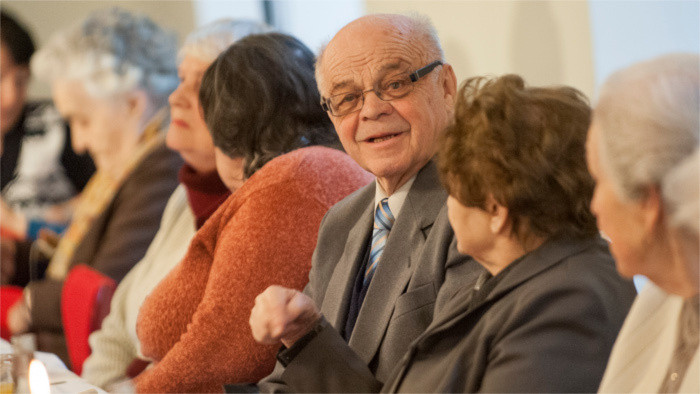On the 10th of November, local elections are to be held in Slovakia, and foreigners over the age of 18 who have permanent residency in Slovakia can vote too. In the past three weeks we have brought you information on how to cast your ballot and what the plans of Bratislava's mayoral candidates are. You can find this on our webpage www.rsi.sk in the Politics section.
Today we will take a look at the topic of social services and public order. This year the city of Bratislava has allocated €14 million to social services, which represents about 3.9 percent of total expenditures. Almost all candidates declare that they are preoccupied by the ageing of Bratislava's population and the shortages of affordable social services for old people such as retirement homes or caretakers who could visit their clients at home. Currently, seniors and their families have to deal with long waiting lists for these services.
A total of €41.6 million from Bratislava's budget went to public order, mainly to fund the so called city police. This sum represents 11.3 percent of total expenditures. Although regarded as a safe city, a few high profile murders shocked the inhabitants.
The incumbent mayor Ivo Nesrovnal, a lawyer by profession, says that under his leadership the city hall has increased funds for the seven facilities for seniors that it has in its portfolio and it has started reconstructing some of them. Nesrovnal wants to complete and expand the camera system in the city, to improve the technical equipment of the city police and strengthen its competencies. He plans to continue improving the public lighting system, too.
Matúš Vallo, an architect by profession, promises to improve the quality and availability of caretaking services for seniors, especially home care, by supporting existing providers. Senior citizens will enjoy a better, longer and more comfortable stay in the public space in Bratislava thanks to 1,000 original benches. People with disabilities should benefit from a more transparent parking policy. If elected mayor, Vallo wants to increase the number of city policemen, pay them better, and install more modern surveillance cameras. In those areas with higher crime rates, he proposes to set up a non-stop open space for the city police.
Ján Mrva, who is currently the mayor of the Bratislava borough of Vajnory and a surveyor and cartographer by profession, wants to modernize and expand the CCTV system to 471 cameras, improve the work of the city police and recruit more city policemen by offering them social benefits.
With an increased number of patrols in the city over the weekend, Mrva plans to introduce intelligent public lighting pillars with modern features like cameras and a "threat button" which can be pressed by people to alert the police. When it comes to social services, he also wants to support care services for older people in various forms. Mrva wants to build low-cost facilities to provide available social services to the estimated 4,000 to 5,000 homeless people in Bratislava. He wants to set up training flats and a social enterprise to bring these citizens back to a normal life.
Vaclav Mika, the former general manager of Slovak public radio and television and an economist by training, wants to improve the quality of social services and encourage schools' canteens to open up to older people too as a tool for contact between generations. He plans to set up a hotline and a counseling site dealing with all social problems and the life situations of seniors, people in need and those with disabilities. It will be linked to an ombudsman office. When it comes to public order and safety, Mika wants to increase the number of city police patrols on the streets, create drunk tanks, extend the CCTV system and its use to punish offenders.
Iveta Plšeková, Bratislava's current deputy mayor and a GP by profession, plans to set up a client centre where people can access any kind of information regarding social services and promises to improve the quality of services provided in retirement homes as well as increasing their employees' salaries. The deputy mayor supports active policies that would help homeless people find a job and return to a normal life. She thinks that it is necessary to improve public lighting by replacing it with an efficient and safer one. She also wants a modern CCTV system and to increase the number of city policemen by about 500. The aim is to increase police patrols on the streets.
Entrepreneur Viktor Bereš allocates spaces for 100-150 people who will serve as clubs for pensioners in Bratislava where they will be able to organize their social events free of charge. There will also be a kitchen where they can cook. He wants to build short term accommodation facilities for homeless people. More patrols of city police should be on the streets too.
Miroslav Vetrík, a teacher, wants more city policemen on the streets including patrols with dogs in areas with higher crime rates. They will check not only on public order but also how clean streets and public spaces are. Setting up drunk tanks and fines for brawlers are on his agenda too with a note that most of such offenders are homeless people. Vetrik wants to support families in need.
Roman Ruhig, an entrepreneur, wants to bring the city police closer to inhabitants and have a bigger role in preventing crime. He plans to introduce free school buses for children. The city hall should build what he calls "Homes of New Hope" whose aim is to build integrated housing for seniors in social services and single mothers with children who, for economic or other reasons, cannot afford their own housing. He wants to build short-term accommodation facilities for homeless people and help them find work.
We could not find out what the plans of candidates Andrej Trnovec and Jaroslav Brada are concerning the topic discussed today.


